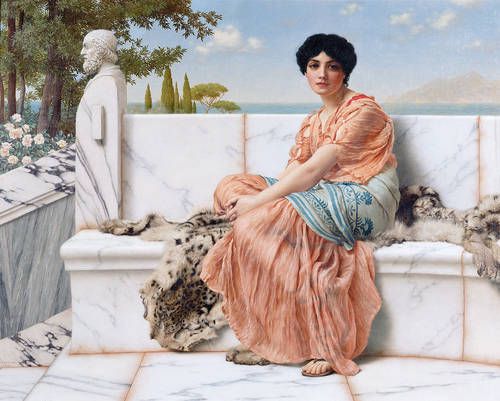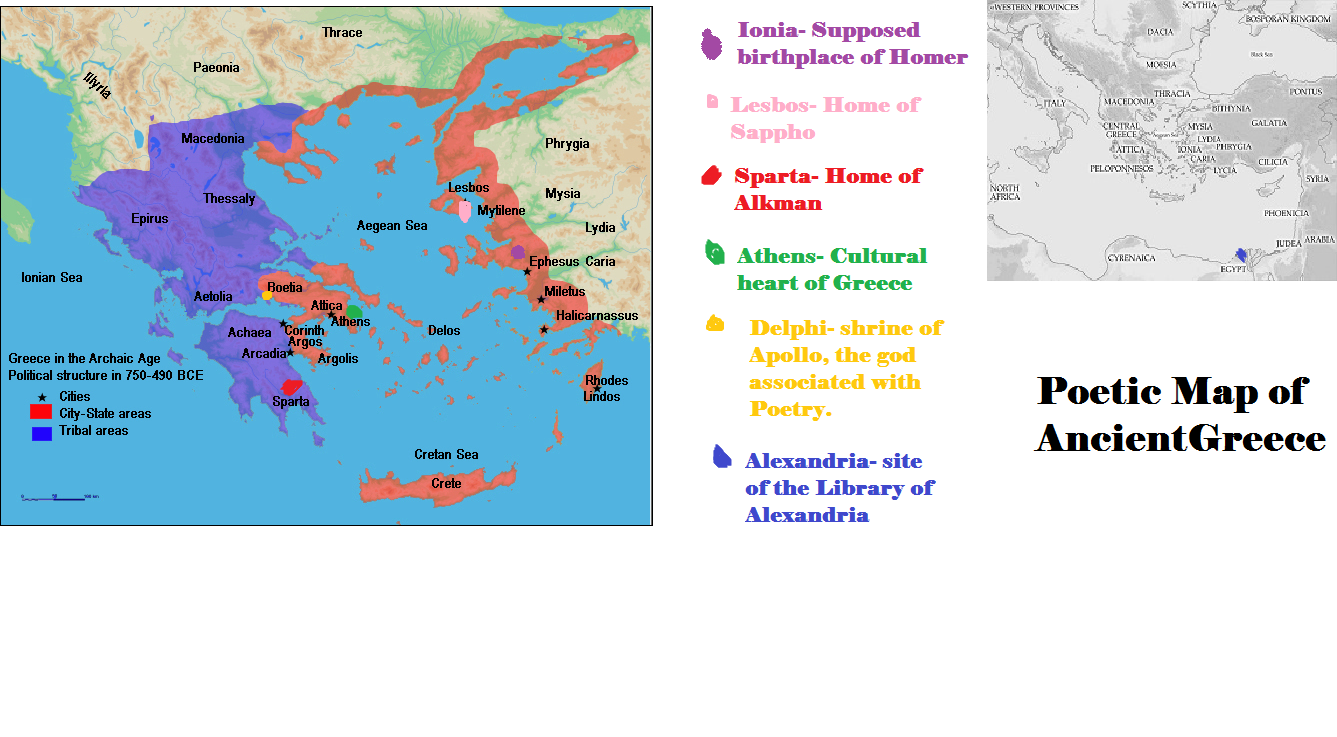Athenaíí: Looking Back
Aristotle in his Poetics divides poetry into three different categories: lyric (verses meant to be sung and accompanied by an instrument), dramatic (the spoken verse in which Greek drama was written), and epic ( a single, long narrative, usually telling of the exploits of gods and heroes.) Homer's The Iliad and The Odysseys are the best-known examples of Ancient Greek epic poetry; the tragedies of Aeschylus, Sophocles, and Euripides were performed in dramatic verse; Sappho, after Homer, perhaps the best known of Ancient Greek poets, composed lyric poems.
Like the other types of poetry, lyric verse was composed to be performed in front of an audience. It was divided into two categories: monodic and choral. A monodic verse would be performed by the poet themself, accompanied by an instrument such as the lyre, the root of the word "lyric", and intended for small-scale, intimate gatherings such as symposia, drinking parties. While a choral verse would feature a group of seven to fifty people, singers, dancers, and musicians directed by the poet, performing at a civic or religious festival.
The Spartan poet Alkman, writing in the seventh century BCE, provided an example of a choral poem meant for a state-sponsored festival. Greek lyric verse frequently tackled the perennially popular subjects of love, sexuality, and marriage. Alkman's First Maidens Song features young women describing each other in sexualized language:
"Oh, that Astaphis be mine,
May Philylla look over,
And Damareta and desired Ianthemis-
But Hagesichora overwhelms me."
(Alkman 1: 74-77)
The girls performing were possibly taking part in an initiation ritual, perhaps the betrothals of Hagesicora and Agido, the two leading the chorus whose verses praise them (Hubbard 26). Instead of presenting homoerotic desire between women, Alkman's words are meant to portray the maidens singing them as objects of desire for the men in the audience and potential brides. Women in Alkman's Sparta enjoyed more freedom than the counterparts elsewhere in Greece. Physically fit and outspoken, they were often left to run Sparta while the men were off fighting. Called "thigh flashers" because of their short chitons, they were reported to be sexually uninhibited and it was imagined that they engaged in "female-bonding" while their husbands were away. Like today, girl-on-girl was far too often used as titillation for men rather than a genuine representation of lesbian relationships.
The term "lesbian" comes from the Greek island of Lesbos, the home of the poet Sappho, who wrote about passionate, possibly romantic, bonds between women in the sixth century BCE; the word "Sapphic," meaning sexual attraction between women, is named after her:
"...with pure, sweet oil
...you anointed me,
And on a soft, gentle bed...
You quenched your desire...
...no holy site...
We left uncovered,"
(Sappho 14: 17-23)
"Pacing far away, she remembers
Gentle Atthis with desire,
Perhaps ...consumes her delicate soul;"
(Sappho 15: 15-17
Most of Sappho's poetry was intended for small gatherings of her female intimates and are more likely to portray lesbian desire that is removed from the male gaze. Love of all kinds and at all stages, from girlish crushes "Sweet mother, I cannot weave-Slender Aphrodite has overwhelmed me with longing for a boy. (Sappho 18)" to the jaded cynicism of a breakup "But as my friend, take to a younger bed; I won't endure living with you since I am the elder (Sappho 28)" is the primary theme of her poetry.
The legendary poet Homer is considered the first great writer in the western canon and the works attributed to him, The Iliad and The Odyssey, were the bedrock of Greek literature. His definitive telling of the Trojan War ( a ten-year long conflict between Greece and Troy, an Anatolian kingdom) inspired countless writers over the centuries. The catalyst for the Trojan War was the elopement of Helen, the queen of Sparta, with Paris, a Trojan prince. Alkaios, a contemporary and alleged lover of Sappho, takes the characteristically male viewpoint of blaming Helen for the destruction caused by the Trojan War:
"...and excited the heart of Argive Helen;
Maddened by the Trojan man,
A traitorous guest, she followed him
In a ship on the sea,
Leaving at home her child...
And her husband's richly covered bed...
Her heart persuaded by love...
Daughter of Zeus and Leda
...many of his brothers...
...many of his brothers...
...the Trojan plain holds conquered
Because of the woman,"
(Alkaio 6: 1-12)
Sappho is more sympathetic towards Helen, who she sees as being led astray by passions she cannot control:
"Consider that Helen, far surpassing the beauty of mortals,
Leaving behind the best man of all,
Sailed away to Troy.
She had no memory of her child or her dear parents,
Since she was led astray by Kypris (a name for Aphrodite)..."
(Sappho 4: 6-12)
Sappho's work stands out to us today as a rare female voice from the ancient world. Her writing can be described as feminine since it describes affection between women and their romantic and domestic lives, instead of the macho world of heroes and battles favored by her male contemporaries. It would go on to influence later female lyric poets such as Erinna (writing in the fourth century BCE) and Melino (a Greco-Italian poet writing in the second century BCE).
Athens, which fancied itself the cultural heart of Greece, deliberately excluded women from its political and intellectual life. A talent for writing would have been considered odd, even freakish, in a woman. Women of genius, such as Sappho, were seen as abnormal and placed in a class of their own, slightly above the rest of their sex but still not as good as men. Like in Sparta, women in Sappho's Lesbos enjoyed a rare degree of freedom and were subject to sexual slander. Artists up to the Victorian era portrayed Sappho as a wild and sexually voracious woman, making her a victim of the male gaze that her work subverts.


The works which survive from the ancient world were the ones deemed important enough to be copied over multiple times, giving them a better chance of making it through the centuries. Sappho's writing was considered worthy and a larger number of her poems are available to use both in full and in fragments but many of her female contemporaries would not have been as fortunate.

Works Cited
Hubbard, Thomas K. Homosexuality in Greece and Rome: A Source Book of Basic Documents. Berkley and Los Angelos: University of California Press, 2003. Print.
Rayor, Diane J. Sappho's Lyre: Archaic Lyric and Women Poets of Ancient Greece. Berkley and Los Angelos: University of California Press, 1991. Print.
Bạn đang đọc truyện trên: AzTruyen.Top